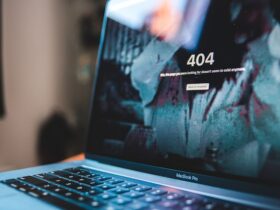In this age of digitization, the modern world is getting increasingly dependent on various forms of digital technologies. An individual tends to store their photos and personal information on their smartphones or laptop devices. As we move more towards shifting our lives online, a digital risk can consequently lead to a surge in the reports of cybercrime.
When it comes to safeguarding data against cyberattacks, individuals and organizations face multiple challenges. Thus, to make sure that our data is safe from cyberattacks, we must consider technological investments to protect our data from hackers. Here is when cybersecurity steps up and comes to your rescue!
What Is Cybersecurity?
Cybersecurity is the process of protecting your information on computer systems or networks from unauthorized cyberworld attacks, destruction, alteration, or misuse. The information protected can be personal data, intellectual property, internal information, government information, and so on.
As digital footprints increase exponentially, the ultimate goal is to avoid attacks that involve gaining control of the computer, networks, databases, or any combination of them.
According to the CISA, 1 in 3 homes that had computers were infected with malicious software. In addition to that, 47% of American adults’ private information was leaked on the internet due to their accounts being hacked by cybercriminals.
If you would like to make a difference in protecting internet users’ information, you can consider pursuing a career in this field. You could help people on the individual level or protect organizations’ information. In either case, you would benefit from completing a cybersecurity online masters program to gain the technical and professional skills preferred by government organizations, state laboratories, law enforcement, and private sectors.
How to Strategize the Development of Cybersecurity in an Organization?
If you’re working as a cybersecurity professional, you can headstart your journey into ensuring your organization’s data privacy by identifying where your company stands in terms of preparedness. You should pose a bunch of questions to assess the company in case of an unauthorized attack.
Are there any potential risks or threats associated with cybercrime? Is the company facing financial losses each year due to cybercrime attacks? Does the company know about the up-to-date trends and procedures of hackers? Is there an immediate, effective response or contingent plan in case of a looming threat?
If your firm examines the questions above and has some unfavorable answers, then it must develop a detailed plan to implement a sound cybersecurity strategy.
The Significance of Cybersecurity
With that said, here are some reasons why cybersecurity is crucial for individuals and organizations.
Security of Individual Data:
The cybersecurity measures set for personal use can protect personal information, such as bank details, social security numbers, and healthcare accounts. Personal data protection is as important as a company’s data because the theft of personal data can lead to identity theft, financial theft, and other malicious activities. An individual’s data is often stored on mobile devices, laptops, tablets, and desktops, making it vulnerable to cybercriminals.
Thus, individuals should encrypt their data, as it makes it difficult for a hacker to misuse their data when it is encrypted. Encryption data ensures that no unauthorized person other than you can intercept your data. Even if someone ends up getting a hold of your encrypted data, they won’t be able to access it.
Preservation of Business Assets
The role of cybersecurity in preserving an organization’s financial position cannot be overstated. It helps businesses protect themselves against data breaches, phishing scams, and ransomware, and it also ensures the ultimate protection of their data, customers, and brand reputation. So, by ensuring strong cybersecurity measures, companies can protect their data of business assets and prevent potential fines and penalties.
According to IBM security, the average cost in case of a data breach for businesses in 2020 was around $3.86 million.
Complying to Regulations
Cybersecurity is crucial for complying with data protection regulations, such as the California Consumer Privacy Act (CCPA) and the General Data Protection Regulation (GDPR). Otherwise, non-compliance or violation of such laws can cost business organizations significant fines and reputational damage. As the digital ecosystem evolves, implementing such practices ensures robust cybersecurity practices.
Protection of Critical Infrastructure
Cybersecurity’s role is also crucial to safeguard the functionality and protection of critical infrastructure of a region, including power grids, transportation systems, and healthcare networks. The quality of data protection cannot be compromised because it can directly affect public safety and national security.
Promotion of Digital Trust
A certain level of digital trust should be developed among consumers when you move your activities online. Higher security measures can help build consumer confidence and strengthen business relationships, both of which are good for business.
How to Become Better at Securing Your Data?
Here are some of the ways an individual or companies can improve their data-protecting game:
- Use a Strong Password: Always include eight characters, combining numbers, symbols, and lowercase and uppercase letters.
- Adopt a Password Manager: A good password manager can help you monitor and remember your passwords and generate strong ones.
- Avoid Reusing Passwords: Do not use your old passwords, as it makes it easier for hackers to access and hack your accounts.
- Use Two-Factor Authentication: Make sure to add two-factor authentication to add an extra blanket of security by entering a code from your phone or email with your password.
- Back up Your Data: Constantly sync your devices and back up your data frequently to still have access to it in case your device gets lost or stolen.
Last Few Words
We must take stern measures to safeguard our internet data, just like we would protect other valuables. Businesses of all ages and sizes should learn about the potential risks to protect themselves and their customers.
Moreover, individuals should also monitor their online activities and deploy measures to protect their private information. We can help to make the internet a safe place for users with strict cybersecurity practices.











FIND US ON SOCIALS